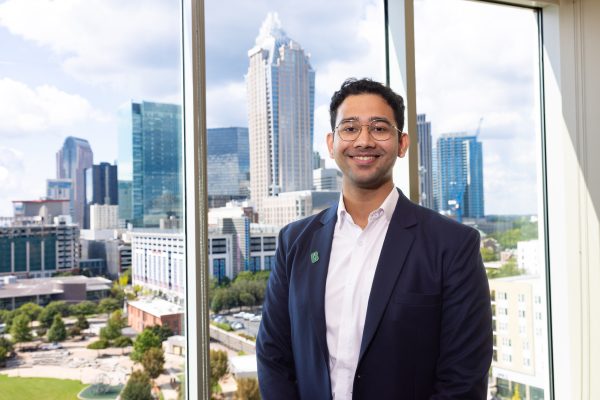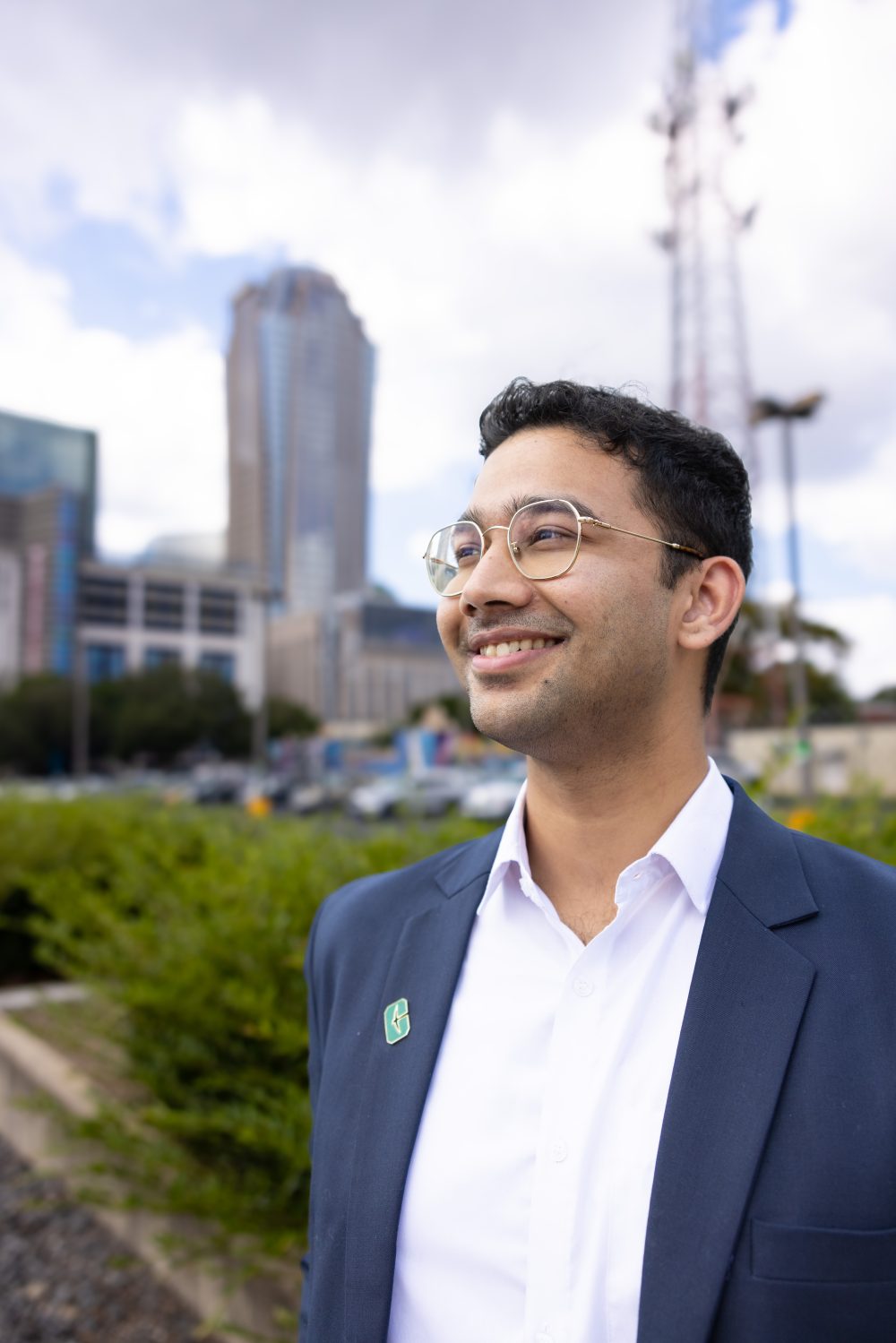Searching for soul: One Ph.D. graduate’s quest to unearth humanity in AI

Sri Yeswanth “Yash” Tadimalla knows what the future could hold: a world where people live in harmony, where technological advancements are the surging tide that raises the impoverished into prosperity and the hungry into comfort while empowering the voiceless. He knows it’s possible, but also acknowledges that it’s going to take a bold vision, collective commitment and plenty of hard work to make it happen.
Not everyone believes they can change the world for the better, especially in the face of sweeping societal changes brought about by the widespread implementation of artificial intelligence technologies. But Tadimalla is a true representative of Niner Nation’s can-do attitude, crediting his fellow 49ers with giving him the confidence to dream big and boldly in pursuit of a better tomorrow.
“This university has so many great people who are doing amazing things,” Tadimalla said.
Receiving a Ph.D. in software information systems and sociology this summer, Tadimalla has been hard at work creating a roadmap of sorts to explain and understand the various drivers of the current AI landscape through the idea of a human-AI interaction “ecosystem” and “AI Identity” as shaped by societal ideas and priorities around tech development and philosophies around its design.
As AI technologies become more powerful and more intertwined with our lives every single day, its potential to be used for tremendous good or as a tool to further divide is growing exponentially. Through Tadimalla’s work, he hopes to carry the torch of his academic mentors forward in helping the world better understand AI in all its complexity to both enhance its ability to benefit lives and prevent the perils of its potential abuse.
“Who is creating this technology and who is influencing it? What is the infrastructure needed for developing and understanding AI, and what are the socio-technical frameworks shaping the technology? What are the consequences and considerations of how AI is changing life as we know it?
“These are the questions I’m working toward answering,” Tadimalla said.
The power of tech
Hailing from India, Tadimalla grew up in Hyderabad. He lived in the bustling city most of his youth, but often spent his summers visiting his grandparents in the rural farming community of Kovur and Machilipatnam. Tadimalla’s father is a business executive in the fields of infrastructure development, business expansion and legal compliance, and his mother was a former public relations expert who chose to become a homemaker during his childhood.
Tadimalla was drawn to technology from an early age. He was entranced by video games and also used computer programs as creative tools. He loved expressing himself through the classic Paint program on Windows, and would make PowerPoint slide presentations filled with rudimentary animations and movie recordings.
He learned quickly that technology isn’t just something fun to play with — it’s something that could dramatically change people’s lives in ways that couldn’t have been previously imagined.
“I grew up at a time when the impact of computing was really clear in India,” Tadimalla said. “I saw firsthand the economic development that came with technological advances. That ability to empower strongly resonated with me.” At the time, he hoped to one day start a tech company of his own as an entrepreneur, thinking that striking out into the technology business was the best way he could make a positive mark on the world.
First, Tadimalla studied computer engineering at the Hyderabad Institute of Technology and Management. In the classroom, he honed the computing skills he felt he’d need to make an impact in the world of tech. But it was outside the classroom — particularly on a United Nations volunteer trip to Sri Lanka — where Tadimalla first started to feel the pull toward committing his life to helping others and humanitarian causes.
“It was incredible,” he said. “That experience really made me realize the importance and value of being a global citizen.”
Tadimalla initially only planned to get his master’s degree before embarking on a career as a tech entrepreneur. He knew that leaving home to study abroad was the best way to broaden his horizons and gain the breadth of experience needed to truly follow his dreams.
It wasn’t just the school’s reputation for excellence in computer science that swayed Tadimalla to apply to UNC Charlotte for grad school — he was also thrilled at the prospect of living in a thriving, growing business powerhouse like Charlotte and about the chance to live near close relatives in North Carolina.
It all added up to a clear choice for Tadimalla. He proudly joined Niner Nation and the College of Computing and Informatics in pursuit of his M.S. in computer science with a concentration in data science.
While working toward his master’s, Tadimalla began getting more and more involved on campus over time. “I basically have done every job you can do in the Student Union,” he said, reminiscing on his experience working in event organization, at the information desk and other part-time jobs that helped him realize how much he loved connecting with fellow students.
Soon, he dove into advocacy for graduate students through the Graduate and Professional Student Government (where he served as president last year) and the Center for Graduate Life and Learning (where he served as a grad-life fellow). These roles introduced Tadimalla to the Student Involvement office, and ultimately to three staff members who ended up being major mentors and on-campus champions: Vice Chancellor of Student Affairs Kevin Bailey, Associate Vice Chancellor of Student Affairs Karen Shaffer and Christine Reed Davis, former Associate Vice Chancellor for Student Affairs and Dean of Students.
“They helped me realize that I could do more than just make money,” he said. “They helped me figure out that I enjoy working with people. Looking back, they were huge influences in helping me find my purpose.”
At a crossroads
Eager to continue his education, Tadimalla was at a crossroads. Did it make sense to stick with his tech-based aspirations? Or would a new lane of research like education leadership be a better fit given his growing love of student affairs work? Was UNC Charlotte still his best option?
Searching for his next move, his friends in Student and Academic Affairs encouraged Tadimalla to chat with some CCI faculty who might prove helpful. They recommended he speak with Tonya Frevert (a UNC Charlotte organizational science Ph.D. graduate and then an assistant research professor in CCI), who in their first meeting introduced him to Mary Lou Maher (then-professor of software and information systems, now professor emerita).
Maher and Frevert told Tadimalla all about their research, touching on the ways humans interact with computers and how technology in turn impacts society. As their conversation continued, something clicked.
“It was an amazing connection,” he said. “They made me realize that whatever I wanted to do with student affairs, with higher education leadership, I could do within computer science education.”
Best of all? “I didn’t have to go searching for that meaning somewhere else,” he said.

From knowledge to impact
Tadimalla realized that the best way to pursue his twin passions for technology and social impact would be to embark on a non-traditional interdisciplinary Ph.D. degree program pairing sociology with software and information systems. He decided there was no better place to follow this unique path than UNC Charlotte, turning down multiple offers from other prospective schools in the process.
Tadimalla now works closely with faculty from both sides of the coin of his combo-degree program. On the CCI side, the software and information system department’s Professor Manuel Pérez Quiñones and Assistant Professor Cori Faklaris have become key partners, helping Yash deepen his understanding of human-computer interaction and the powerful role computer science education plays in the technological ecosystem.
Over in the College of Humanities & Earth and Social Sciences, Chancellor’s Professor and Professor of Sociology, Public Policy and Women & Gender Studies Roslyn Arlin Mickelson, Professor of Philosophy & Director of Center for Professional and Applied Ethics Gordon Hull and former undergraduate education dean and Professor of Sociology Lisa Slattery Walker worked closely with Tadimalla. They’ve given him invaluable guidance in understanding how organizational features of higher education institutions and AI Readiness interact with individuals within those institutions’ own overlapping, intersecting identities to affect learning outcomes, all with an eye toward applying those principles to the world of AI and computer science education.
Together with Mary Lou Maher, these five professors-turned-colleagues of Tadimalla’s have joined forces to serve as his dissertation committee. “I’ve grown so much through working with these incredible professors,” Yash said. “I’m so grateful for their mentorship and can’t imagine where I’d be without their wisdom and support.
At the beginning of his doctoral studies, Tadimalla conducted research on cultivating a sense of belonging among computer science students. Along the way, with collaborators in many CCI-affiliated research groups including the Center for Humane AI Studies, the Center for Education Innovation Research and the Human-Centered Computing Lab, Tadimalla has delved deeper into how the computing industry and academic institutions can best use and develop AI technology with ethics and human impact in mind while giving people the tools they need to understand all of the ways AI can affect society.
“How can we teach AI to the next generation so they can be good, responsible creators? AI literacy is the solution, and the goal for much of my current work,” Tadimalla explained. He’s furthered that work both through his time in the classroom, both as a pupil and as a graduate student instructor helping guide undergraduates through the complex world of human-AI interaction and social theory.
Always looking for opportunities to apply his unique set of interests toward helping the greater good, Tadimalla has spent much of his free time as a graduate student working with international policy advocacy groups affiliated with the United Nations. He has served as President of the World Student Platform for Engineering Education and Development (SPEED) and was appointed the Global Focal Point for the Science-Policy Interface for the UN Major Group for Children and Youth. Through these roles he’s engaged with policymakers, thought-leaders and fellow scholars at high-level summits and conferences the world over, doing his best to “bridge the gap between scientific insights and policy decisions,” he explained, all toward the goal of “ensuring that the voices of the youth and underrepresented are effectively represented and integrated into global policy dialogues.”
The path ahead
Having completed his Ph.D., Tadimalla plans to continue advocating for the ethical development and implementation of AI by serving as a bridge between academia and industry. He will continue his affiliation with UNC Charlotte, teaching AI courses in the Department of Computer Science. He has also received the Computing Innovation Fellowship, funded by the National Science Foundation (NSF) and has been named one of three AI education Fellows, a special cohort that will be based at the Computing Research Association with whom he will spend the next year contributing to national initiatives that aim to expand capacity in artificial intelligence education and advance frameworks for trustworthy AI development.
Thanks to the lessons learned and life-changing relationships he has built over the years on campus, Tadimalla knows that this University, this community, has helped him grow into a leader he has always aspired to become—a leader who will leave the world better than he found it.
“My time at UNC Charlotte has helped me reach opportunities that I never would have dreamed about,” he said.